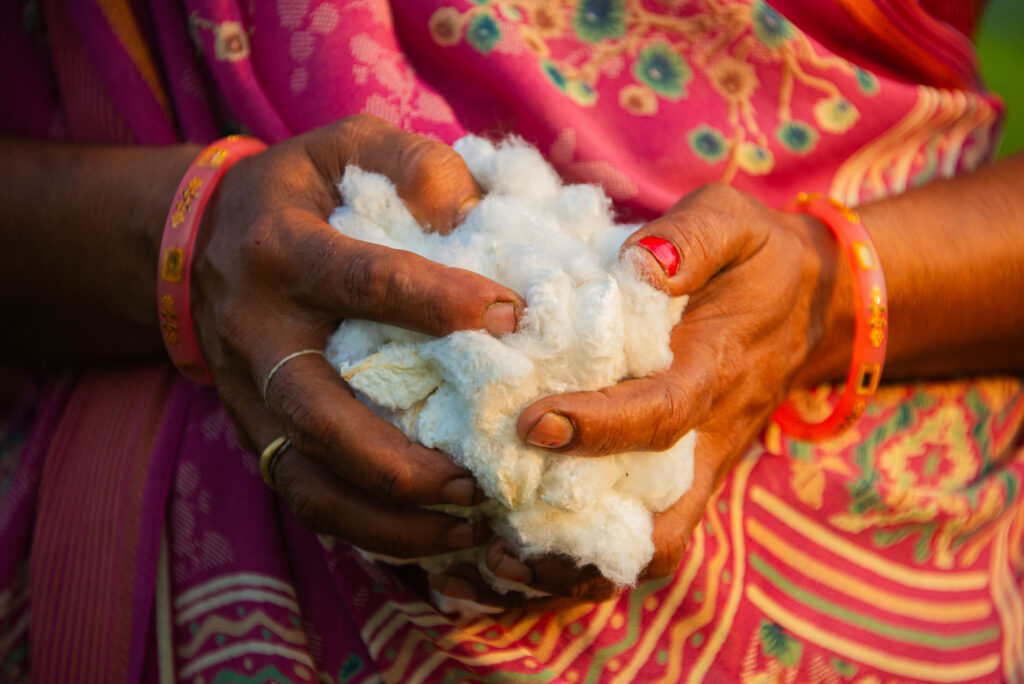



By Sahar Haq, Senior Social Impact Coordinator and Yrene Coli Rivera, Senior Gender Equality Coordinator at the Better Cotton Initiative (BCI)
When Ayesha, a smallholder cotton farmer from Pakistan, talks about her daily work, she lists preparing the soil, weeding, harvesting, and collecting stalks. “Without our hands, there is no cotton,” she says. Ayesha echoes the thoughts of thousands of women farmers in Sindh, Pakistan, where 93% are engaged in sowing, 77% in weeding, 69% in picking, 40% in soil management, yet only 12% in managing finances.
In Gujarat, India, women are similarly at the heart of cultivation: 63% sow, 89% weed and 91% harvest. But market systems and mobility restrictions mean only 23% are involved in selling cotton, and just 13% participate meaningfully in household farm management decisions.
Recent studies by the Better Cotton Initiative (BCI) in Sindh and Gujarat reveal the scale of women’s contributions to cotton – and the hurdles they face in moving from invisible labourers to equal decision-makers. Across the regions, women carry out most of the manual and time-intensive work of cotton farming while also managing household responsibilities. As one woman farmer from Pakistan explained, “After the fieldwork, there is still all the housework waiting. There is no time left for us.”
The knowledge and labour of women farmers sustain their households and communities. Yet, the systems in place mean women in the region are rarely consulted on how farm earnings are invested, how they use their time, or how families adapt to the challenges of climate change. This exclusion not only limits women’s income and decision-making power but also leaves families less resilient to economic and climate shocks. On International Day of Rural Women 2025, we shine a light on these experienced farmers whose labour sustains households, livelihoods, and the wider economy.


Identifying systemic barriers
Across both geographies, three barriers stand out:
- Time poverty: In India, unpaid care and farm work absorbs most of women’s time daily. Women reported to have little or no time to engage in activities that earn additional income. In Pakistan, up to 78% of women’s off-farm time is spent on collecting firewood and water for household needs.
- Limited access to resources and markets: Without equal access to markets and resources like credit and land, women are held back from adopting regenerative farm practices that build resilience.
- Decision-making gaps: In many households, men retain final authority because they have access to networks, extension services and market access.


In spite of all that, women’s aspirations across the region are clear. In Pakistan, 65% of the surveyed women farmers said they could manage their own farms and showcased high levels of interest in and willingness to work with technical practices for pest management and land preparation.
“We know which seed is good, but we cannot go to the shop. My husband buys it. If I go, people will talk.”
Woman farmer, Gujarat
The Better Cotton Initiative’s role
As the world’s largest cotton sustainability programme, BCI supports the building of an enabling environment for women farmers to access and own resources and practice regenerative cotton production as a pathway to empowerment and ecosystem resilience.
Through our Principles & Criteria, gender is embedded as a cross-cutting theme. Farm clusters establish Gender Committees and appoint Gender Leads, creating formal structures that address barriers and ensure women farmers can participate in decisions, access training easily, and take on leadership roles.
Working with our partners, we take this further by:
- Expanding leadership pathways with an impact target to increase women field staff globally. By recruiting women into these roles, partners ensure women farmers are supported by peers and visible role models in their communities.
- Reducing time burdens through practical solutions such as labour-saving tools, flexible training schedules and childcare support, so women can engage more fully in training and markets.
- Strengthening women’s collectives and self-help groups, giving women the chance to pool resources, access security nets, improve bargaining power, and gain a stronger voice in markets and community forums.
- Promoting gender dialogues within households, encouraging men and women to share responsibilities and decisions, helping to shift norms and expand women’s influence in farming.
These actions reflect our 2030 Strategy, which links gender equality with broader impact goals on livelihoods, climate resilience, and regenerative agriculture.
The road ahead
Rural women in cotton are not passive beneficiaries; they are farmers engaged directly throughout the production cycle and often facing the harsh impacts of climate change and global economic downturn.
On this International Day of Rural Women, we celebrate what is possible and double down on our commitment. Working with partners, members, producer organisations, and communities, the Better Cotton Initiative is opening new pathways, so women farmers are visible, recognised and empowered, stepping into leadership, accessing resources, and shaping decisions. Cotton can reach its full sustainability only when every farmer’s potential is realised and emboldened.
Sources
- Empowering Women in Cotton: Rethinking Gender Roles, Time Use, and Support Structures, Sindh Pakistan – the full report will be published soon, watch this space!
- Better Cotton Initiative Baseline Report: Women’s Empowerment, Gujarat, India







































